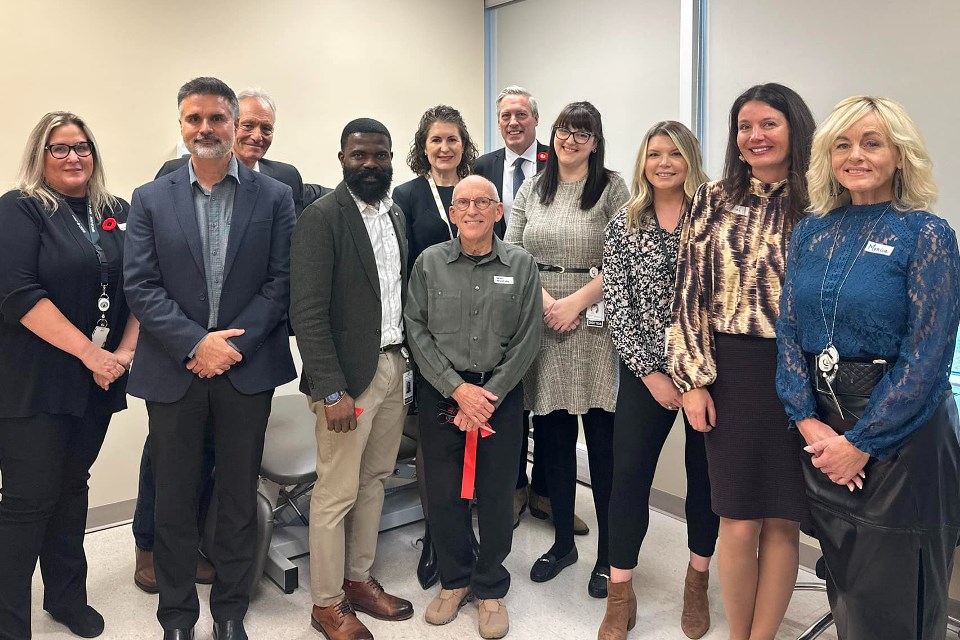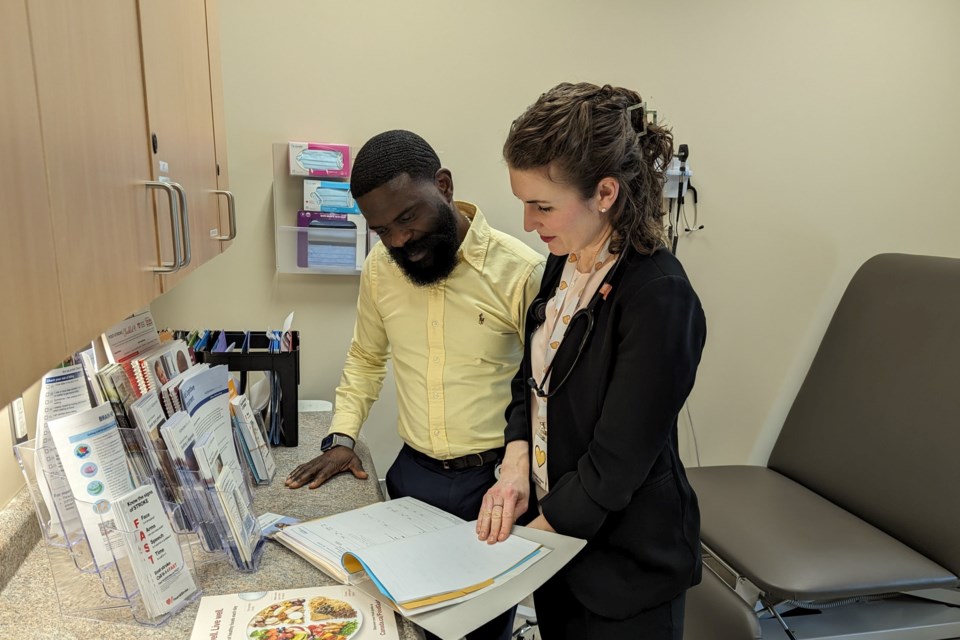A local team of doctors and health-care specialists is proud to share news of the recent opening of a clinic geared to seniors that is already paying dividends when it comes to helping its patients live safely and with dignity in their homes.
The launch of the Specialized Geriatric Clinic (SGC) comes at a critical time, the North Bay Regional Health Centre advises. According to a Northern Policy Institute report, by 2036 the cohort of individuals aged 65 and older will continue to expand and will make up almost 30 per cent of the total population in northern Ontario — while the aging population gap widens as compared to the provincial rate.
The clinic's lead physician, Dr. Ann Marie McKenna has even taken to making visits inside patients' homes when the situation calls for a more personal touch and course of treatment.
"Meeting patients where they are often also involves outreach to the community," McKenna says. "I just came from Barclay House where I saw a patient there because it was easier, it's just around the corner, it's easier for me to go to him."
McKenna says these home visits often help the medical staff get to the root of a patient's day-to-day issues as the visitors get to see for themselves how they are living.
"It's helpful to see that patient in their home environment. When I'm asking them to do things like inject insulin, I see, oh, the needles are stored up above and they can't reach them easily ... Often, it's enlightening because when people come to the clinic, they put on their best self. They're well dressed. They have their medications in a bag or a suitcase, depending on how many pills they're on. If it's in their home sometimes I see the pills scattered all over the table and realize we need to help with medication administration so they are safe and they're not making mistakes that will lead to falls and injuries."
Approximately 3,500 in the district are living with a moderate degree of "frailty," a clinical syndrome in geriatrics which recognizes older adults are losing function because of their physical and mental health issues, McKenna shares. "When you lose the ability to look after yourself over time, that leads to more adverse events when you have health care encounters. For example, a frail person going for surgery to get their gallbladder removed will have more complications," than a relatively healthy person.
"This clinic is designed to help frail older adults be successful in their lives and to achieve their goals in their lives," McKenna says. "And, their goals are the common things that we all want for ourselves. We want to live with comfort, live without pain, and ideally, live independently."
The SGC is situated at the North Bay Regional Health Centre’s 120 King St. West campus and is led by Dr. McKenna, an internal medicine specialist, and overseen by Dr. Dokun Matin Salako, a geriatric psychiatrist with the neighbouring NBRHC Specialized Geriatric Service (Seniors Mental Health and Behavioural Supports Ontario). The collaboration of resources at the King Street facility also includes many community partners and is funded through Ontario Health North East.

The overarching goal of the SGC clinic is for its patients and their families to receive specialty services closer to home and to be supported in achieving a greater quality of life in their later years. The clinic's patients access the program through a centralized referral process. Referrals come from doctors, nurse practitioners, community agencies, and the emergency department. This approach is designed to direct folks to the most appropriate program to meet their specific care needs.
The interdisciplinary SGC team is comprised of a geriatric specialist, nurse practitioners, and geriatric assessors, and offers occupational therapy, physiotherapy, and social work services. It is anticipated SCC will provide care to an estimated 5,000 older adults living with complex and chronic health concerns in Nipissing District.
According to NBRHC, the fledgling clinic is a "key support to Ontario Health North’s Alternative Level of Care (ALC) strategy and along with its existing partners in care, leverages access to the right care in the right place at the right time."
On a recent tour of the facility, McKenna and Salako, accompanied by clinic administrators Monica Bretzlaff and Jessica King, all took turns highlighting patient amenities, such as the ECG or the bladder scanner, or the accessible bariatric geriatric bed that accommodates most patients and makes the assessment process less onerous. The clinic also has a headset that is a game-changer for communicating with patients who are hearing impaired.
The team also spoke about the early effectiveness of this much-needed clinic. These health-care providers are passionately engaged and invested in their work, as shown by their genuine eagerness to share specific patient success stories while observing privacy policies. Some 10 per cent of the clinic's patients received referrals without having a primary care provider, thereby easing pressure on the emergency department.
McKenna is full of energy and ideas, emboldened by the progress the clinic has seen to date. She admits it has long been a dream to help make such a worthwhile venture a reality — a goal more than a decade in the making as she practiced medicine in North Bay.
Ultimately, McKenna says the role of the SGC is to not only identify the medical concerns of the referring physician or clinician practitioner in the community but also to address the concerns of the older adult who often has a more personal agenda for their care that differs from the high-level diagnoses provided by medical professionals.
"Their priorities might be different," McKenna explains. "We'll get a referral for an older adult, who has what we call multi-organ failure. They have heart failure and kidney failure, lung failure or COPD, something along those lines. While the physician often wants help in managing multiple comorbidities, the patient might come to the clinic and say, 'My biggest problem is I'm incontinent and I can't go to church and I have to plan my trips. I have to fast before I go out.' So, that might be their chief concern and if I can, I help them by deprescribing their diuretics for heart failure if they're not needed.
"Deprescribing — actually stopping medications — so that they're continent and they can go participate in the community, it's a win-win. They feel better and they can function."
The clinic is now closely aligned with the seniors' mental health services already in place and conveniently located at the King Street West campus. There, the geriatric specialists meet with the patients to deal with "problem diseases of the mind," as McKenna calls them, such as dementia, depression, and confusion. McKenna says she has noticed an overlap between the two clinics, estimating as many as one-quarter of the total referrals having come from inside the building.
As a psychiatrist, Dr. Salako sees daily the crossover effect between mental and physical wellness. He also believes the proper course of treatment can extend the lives of the aging population in meaningful ways while, in turn, eventually easing the pressure on an overburdened health care system.
"In essence, we're going have to figure out how to continuously support the aging population so that the quality of life for individuals is improved and the system is able to support them. The dark side of that will be that we struggle a bit. We continue to have our system clogged up. Hospital beds are blocked, folks in the community are having poor quality health care, we don't have enough primary care physicians, and we are without enough long-term care beds."
Dr. McKenna picks up the discussion and says the lack of accessible housing is a community concern for North Bay and is an upstream factor contributing to local health care challenges.
The affordable housing crisis is "limiting us in achieving our dream, which is to have everyone at home. Not in the hospital waiting for long-term care. That's beyond the scope of our clinic but we're certainly here to advocate for policy changes."
The Specialized Geriatric Clinic promises to share its results soon. "The next time we chat," says Dr. McKenna, "we'll have stats showing how many we were able to divert from the emergency department. And, ideally, we'll be able to maintain them where many of them want to be — at home."



